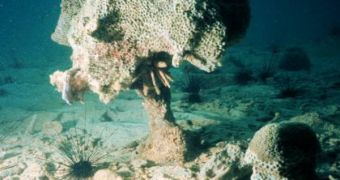Recognizing ocean acidification as one of the most severe issues that will confront the world in years to come, the United Kingdom has recently approved the investment of £11 million ($16 million) into a five-year scientific study of the phenomenon. Current wisdom has it that the level of carbon dioxide in the world's seas and oceans is constantly increasing, on account of the large amounts of pollution human activities are generating, and that this increase adversely and severely affects the creatures of the waters, and, most notably, coral reefs.
Significant percentages of fish species in the world live in or around coral reefs, which support a large array of animals and plants, and provide the cover for a large number of them. But, with acidification, corals around the world are beginning to die. The most obvious effect of increased CO2 concentrations is coral bleaching, a phenomenon in which the organisms change their color from the bright hues that characterize them to white. This is caused by the fact that the microscopic organisms that give the animals their “looks” simply break off from them, and drift in the ocean, where they die.
The corals are entirely dependent on these small organisms for their survival. When they lose their color, the fish species that take refuge among the beautiful structures become exposed to a larger number of predators, which decimate them. Even the fish responsible for consuming invasive algae disappear, leaving the corals defenseless against the advance of the invasive marine plant species. Already, human activities are driving the algae full-speed forward, as recent studies suggest that the organisms are advancing at a speed of up to 50 miles per decade.
“Ocean acidification will be one of the biggest environmental concerns of this century, with major and far-reaching impacts. We need to understand much more about the scale and nature of the effect CO2 is having on our oceans and marine life,” Huw Irranca-Davies, who is the UK Nature and Marine Environment Minister, explained for the BBC. The investigation will be co-funded by the Department for Environment, Food and Rural Affairs (DEFRA), as well as by the Natural Environment Research Council (NERC).
Estimates show that the level of acidification in the world's oceans has increased by more than 30 percent since the onset of the Industrial Age, only three centuries ago. This type of abrupt increases cannot be handled by most species in the water, as evolution usually operates with far larger time-frames. That's why the researchers who will be involved in the new study will seriously analyze the influence of human activities and economy on the marine ecosystems. They are paramount for the survival of many fish species, which in turn help the human race survive.

 14 DAY TRIAL //
14 DAY TRIAL //